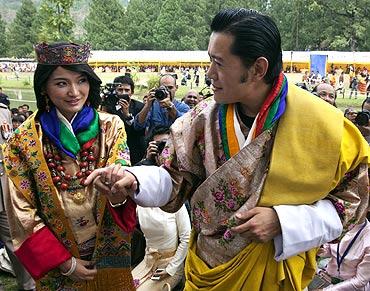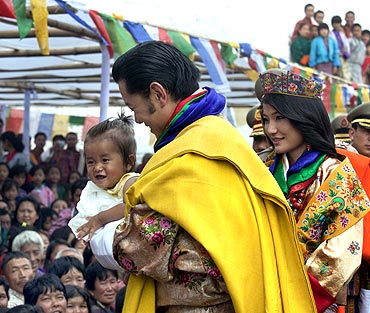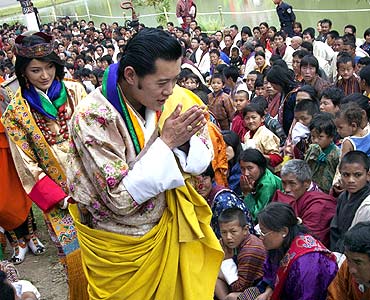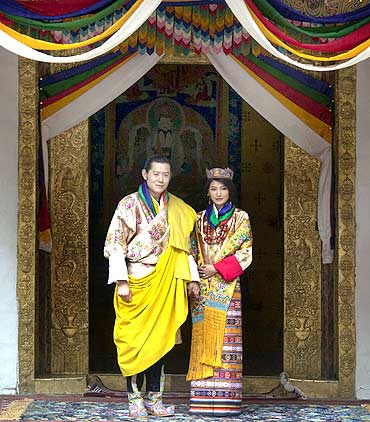 | « Back to article | Print this article |
I am a romantic, says Bhutan's newly-wed king
It was indeed a fairytale wedding. On Thursday, Bhutan's charming King Jigme Khesar Namgyal Wangchuck tied the knot with a commoner Jetsun Pema, making it one of the most talked about royal weddings in south Asia. Neerja Chowdhury recalls her rendezvous with the monarch last year where he spoke his heart out about his plans after marriage, his beloved Bhutan, his love for India and more.
Bhutan is popular for its forested mountain slopes, its clean flowing rivers, its golden fields and organic farming, and for its index of Gross National Happiness as its yardstick of development.
But equally impressive is the country's 31-year-old monarch, Jigme Khesar Namgyal Wangchuck, who got married on Thursday to India-educated commoner Jetsun Pema in Bhutan's old capital of Punakha.
Educated in the West, he has come to be known as the "people's king", who has got to know his country by travelling through it extensively, on foot and on bicycle, and staying in the homes of the locals. He has also cooked for them, and even "cut onions", when he had stopped at a school and made food for 70 students!
The king, who tied the knot at a 17th century monastery, had hinted a year ago that he was contemplating marriage. He spoke to Neerja Chowdhury last year along with other Indian journalists, as they sat facing him in the magnificent throne room in Thimpu -- the room where he was coronated three years ago.
Click NEXT to read further...
'Would like to have an heir soon'
He was viewed as one of the most eligible bachelors then, we had asked? "May not be for so long," the king had replied enigmatically.
Talking with ease and candour, he had said he would have to produce an heir soon because he would like to retire in 20 years time, and to do that he would have to make way for his heir. He is giving himself 20 years, though Bhutan's new constitution allows the king to continue till the age of 65, and this means he could remain the monarch for another 35 years.
"But I feel, by then (in 20 years time), democracy would be well established in Bhutan. If it is not, it will be my failure. If it is (well established), I will have no role to play," he said.
The youngest monarch of one of the youngest democracies in the world, spoke with immense affection and pride of the role played by his father, Bhutan's fourth king, Jigme Singhye Wangchuck, who had "preempted history" and abdicated in favour of his son in 2006. That step had paved the way for a constitutional monarchy in Bhutan and a democratic government.
'My father paved the way for democracy'
Speaking of his father, who is still greatly revered in Bhutan, the king said, "He is not only a workaholic but also a perfectionist. He was wise and systematic. He had been king for 34 years but he foresaw that democracy was the way ahead and the paved the way for it. "
On whether his father continued to guide him in the day-to-day affairs of State, the king said, "He says you are you and you need to learn how to navigate. Once you decide that everything is a means to an end, everything becomes easy. For every decision you must see what will bring happiness to the people."
Since Bhutan became a constitutional monarchy in 2008, the biggest challenge before the young king has been to oversee the successful transition of his country to democracy, while pursuing its own path of development, even as it is landlocked between two giant neighbours, India and China. "We have to become a mindful democracy, " he told us. "Right now we are a learning democracy."
'I value my travels, when I meet people and stay with them'
What did he find most rewarding as well as most difficult?
"The time spent with my father, like talking about the day", he said, was "most rewarding". He also valued his travels throughout the country, "when I meet with and stay with people".
"I find the last 45 seconds before I take a decision to be most the most difficult," he said.
How did he manage to stay so fit? The king said he loved to exercise and did 20-km of cycling every day at 5.30 am and also lot of trekking.
We actually saw the king cycling up the hill at a height of 10,000 feet on his way to Punakha valley. There were two others cycling just behind him, and a pilot car ahead of him. It was such an ordinary a sight; you might mistake him as any young exercise enthusiast.
'If I was not a king, I would be a teacher'
If he had not been king, what would he have liked to become?
"A teacher," he said. Because young people ask questions all the time and " we keep growing with them".
The young king is known for remaining "cool" even in trying situations. What was his secret? The credit, he said, "goes to my parents My father is a good mentor. It is a combination of nature and nurture, which has made me cool."
The topic then turned to India. "We are truly blessed because India is our neighbour," he had said and to Indian food, and Hindi films. He enjoyed Indian food, and particularly liked gulab jamun, kebab roti and South Indian food like dosa and idli.
Which were his favourites Hindi films? "Three Idiots," he had replied unhesitatingly.
Of the Bollywood actors, he liked "Amitabh Bachchan, because I have grown up seeing him. Aamir Khan is very talented. As for Shah Rukh Khan, when you see his movie, you know you are going to enjoy it."
What about the women actors? "I like Kajol". His favourite Hindi song, he said, was "Kabhi Kabhi mere dil maen khyal aata hai."
'I want to remember people and places'
He admitted he was " a romantic". "I write a diary though it is not meant for public. I want to remember people and places. When I go on a trip, I bring a menu card of a nice dinner I have had or a souvenir to remind me of the place or a person. When I went abroad, I took with me a bit of the Bhutanese soil."
And today he has embarked on another romantic journey, and now he will be able to steer his Himalayan nation, along with his wife, the new queen of Bhutan, in its quest for modernity without losing its identity.




